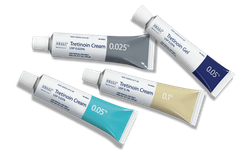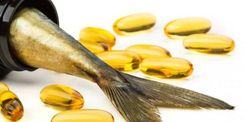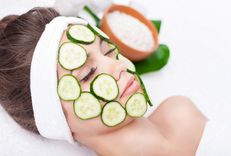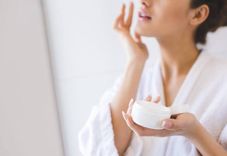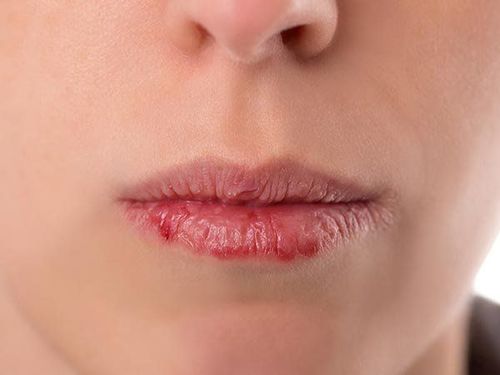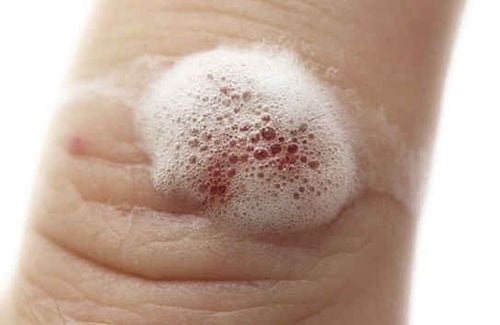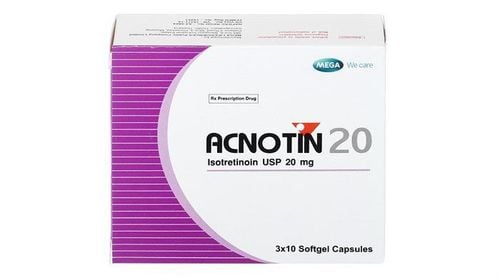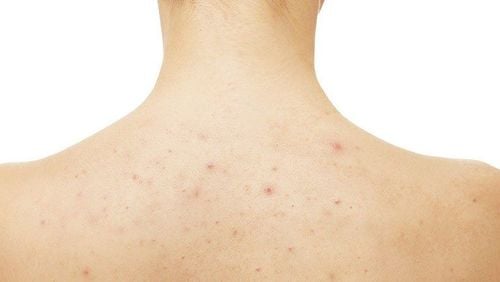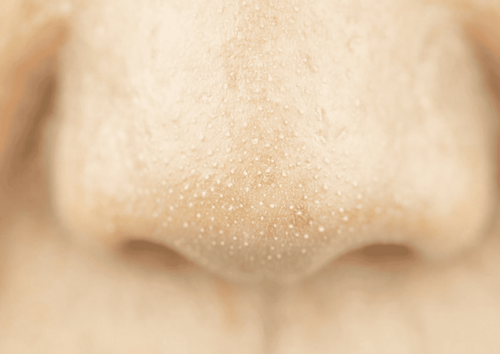Nodular Acne on the cheeks always induces nuisance, especially when it suddenly rises before having a date. Most people who get nodular acne on their cheeks will react by using negative skin treatments such as popping pimples or covering up the acne with many layers of makeup. However, these ways can only worsen the skin's status if you do not understand the causes of nodular acne on the cheeks and treat it safely.
1. What are the causes of Nodular Acne on the cheeks?
Normally, Pimples on the U-zone or Nodular Acne on the cheeks are caused by the accumulation of dirt, oil, and residue that clogs pores over time. While the T-zone - the area that includes the forehead, nose, and all the downward ways to chin is prone to oiliness, the cheeks tend to be drier.
Before figuring out how to get rid of nodular acne on the cheeks, you need to know what causes them. Accordingly, whether you have dry, combination or oily skin, nodular acne on the cheeks is often the result of environmental factors, including the following factors:
1.1. Dirty pillowcases and sheets:
It may be hard to realize, but your bed sheet is a factor contributing to cause nodular acne on the cheeks. In just a short period of time, your bed sheets can become the breeding-ground for fungus, bacteria,dust, pollen, and other allergens.
In fact, Not only your bed sheets but also your pillowcases touch your face, neck, and hair for about seven hours or more every night.
This means that your body is exposed to any dust and bacteria which you carry throughout the day on your bed sheets, the oil from your hair can also be contacted to your face, making the problem worse for those with oily skin.
1.2. Touching hands to your face
Throughout the day, our hands can touch a variety of contaminants and allergens from keyboards, kitchen sponges, or smartphones.
Therefore, When touching hands to the face, these bacteria, dirt, and allergens will be contacted more. Between washing one’s face turns, these substances have time to soak into the skin, potentially clogs pores and contributes to form acne.

1.3. Poor skincare
Many people overreact to acne by rubbing the nodular acne on the cheeks. This is a mistake! The skin on your face is especially sensitive, which means you need to be gentle with it no matter what.
Besides, Skin-care products can also be part of the problem. If you are using skin care or makeup products that contain ingredients like alcohol and synthetic fragrances, they can irritate your skin or clog your pores.
1.4. Improper shaving technique
Shaving techniques can cause irritation and increase the risk of ingrown hairs. This is a factor in the formation of cystic acne on your cheeks.
1.5. Diet
If you have cystic acne on your cheeks or cystic acne in general, your diet can have an impact.
1.6. Hormonal Changes
As with acne anywhere on the face and body, hormonal changes are often one of the biggest factors that influence when acne occurs. That’s why many people often get acne when they hit puberty or are pregnant.
1.7. Metabolic problems
If you have a metabolic problem, pimples on your cheeks may be one of the symptoms. This is because there is a disruption in the body's natural processes that causes inflammation, including acne on the face.
In addition, other factors can also play a role in the development of pimples on your cheeks, such as stress or exercise habits.
2. How to treat and prevent pimples on your cheeks at home?
From the causes, we have the following ways to treat and prevent pimples on your cheeks:
2.1. Wash your sheets and pillowcases
To help get rid of pimples on your cheeks, the first thing you should do is wash your sheets at least once a week to maintain healthy skin.
If you are particularly prone to acne, try sleeping with a clean handkerchief over your pillowcase and changing it daily or changing your pillowcase. If you have long hair, tie it up on top of your head to avoid contact with your face, neck and back while you sleep.
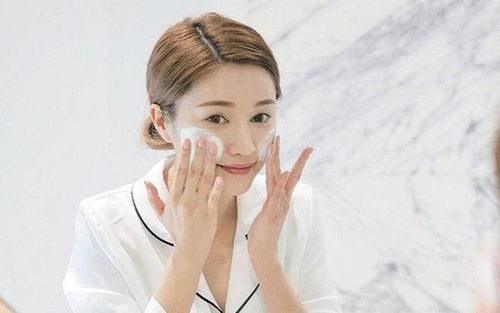
2.2. Avoid touching your face
You should limit touching your face as much as possible, which means keeping your hands off your chin and cheeks. In addition to not touching your face, you should wash your hands regularly between activities to reduce the risk of transferring bacteria, oil, and dirt to your face.
2.3. Improve your skincare routine
When dealing with cheek acne, a skincare routine is a great place to start. Everyone needs to know how to use the right skincare products to ensure that their skin is properly cleansed, treated, and nourished with safe ingredients.
Using harsh chemical cleansers can cause dryness and redness, making the skin worse.
2.4. Practice proper shaving techniques
This is especially true for men, as hair tends to grow thicker and pores are more susceptible to infection. To avoid ingrown hairs and cysts on your cheeks, follow these simple steps:
- Rinse your face with warm water to open your pores.
- Use a shaving cream designed to protect your skin according to your skin type. For most skin types, a single-bladed razor helps prevent pores from clogging with dead skin.
- Use a natural astringent like witch hazel to keep pores clean and refreshed.
- When shaving, always shave in the direction of hair growth. In fact, shaving against the grain may result in a closer shave, but it can lead to irritation and increase the likelihood of ingrown hairs.
2.5. Adjust your diet
- Prevent indigestion: Indigestion is a sign that your body is having trouble processing food properly. This can be due to a lack of water, fiber, or gut bacteria to digest food. This can cause inflammation, the risk of food allergies, and difficulty processing sugar, which spikes insulin and can contribute to excess sebum production, which can lead to cystic acne breakouts. Drink enough water, eat more fiber, and try probiotics like yogurt or kombucha to eliminate indigestion.
- Reduce sugar intake: Reduce your intake of sweets, processed carbohydrates, and sugary drinks. Replace them with unsweetened beverages and whole foods.
- Eat more green vegetables: The right balance of nutrients can also be found in green vegetables, which help to firm and clear skin.
Consider taking supplements: These can help correct vitamin and mineral deficiencies that can lead to skin problems, soothing and nourishing the skin.

2.5. Taking birth control pills
For some women, taking birth control pills can help regulate hormones and help eliminate cystic acne or acne on the cheeks.
You should choose a birth control pill with the right amount of estradiol and low progesterone to treat acne. However, you should talk to your doctor before choosing a birth control method.
2.6. Seek treatment for metabolic problems
Getting treatment for metabolic dysfunction can help reduce or eliminate acne, including cystic acne on the cheeks.
3. Intensive treatments for cystic acne on the cheeks
If your skin does not respond to the above home treatments, you should seek the help of a dermatologist. Your doctor may order some laboratory tests to determine if you have a metabolic problem or hormonal disorder that is causing these problems.
However, you can also try DIY treatments like face masks, exfoliants, and topical treatments that can help treat cystic acne on the cheeks. However, you need to be careful because some ingredients (like lemon or baking soda) can irritate and make acne worse.
3.1. Medication
A dermatologist may recommend medication for severe cystic acne on the cheeks. Common acne medications include antibiotics, Isotretinoin, and Spironolactone. You may be prescribed oral or topical medications.
3.2. The clinical treatments
Some in-office treatments that can be effective include:
- Chemical peels
- Laser therapy
- Intensive facial care
- Steroid injections
In short, there are many different causes of cystic acne on the cheeks, and the treatment method also depends on each case. However, combining many of the above measures can help you have better choices. Accordingly, the most important foundation is still to keep the skin clean; at the same time, you should see a dermatologist if the condition does not improve, instead of arbitrarily intervening, which can easily make the acne on the cheeks worse, limit aesthetics and easily heal with bad scars.
To arrange an appointment, please call HOTLINE or make your reservation directly HERE. You may also download the MyVinmec app to schedule appointments faster and manage your reservations more conveniently.
Reference source: bioclarity.com
